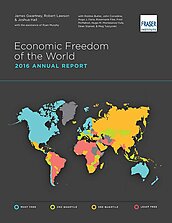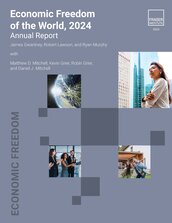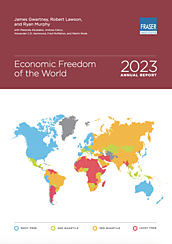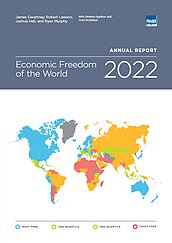Global economic freedom increased slightly in this year’s report to 6.85. Hong Kong and Singapore retain the top two positions with a score of 9.03 and 8.71 out of 10, respectively. The rest of this year’s top scores are New Zealand, 8.35; Switzerland, 8.25; Canada, Georgia, Ireland, Mauritius, and the United Arab Emirates at 7.98; and Australia and the United Kingdom at 7.93.
The United States, once considered a bastion of economic freedom, ranks 16th for a second consecutive year with a score of 7.75. Due to a weakening rule of law, increasing regulation, and the ramifications of wars on terrorism and drugs, the United States has seen its economic freedom score plummet in recent years, compared to 2000 when it ranked second globally.
The rankings of other large economies in this year’s index are Germany (30th), Japan (40th), South Korea (42nd), France (57th), Italy (69th), Mexico (88th), Russia (102nd), India (112th), China (113th), and Brazil (124th).
Nations in the top quartile of economic freedom had an average per capita GDP of US$41,228 in 2014, compared to US$5,471 for bottom quartile nations. Moreover, the average income of the poorest 10% in the most economically free nations is about twice the overall average income in the least free nations. Life expectancy is 80.4 years in the top quartile compared to 64.0 years in the bottom quartile, and political and civil liberties are considerably higher in economically free nations than in unfree nations.




